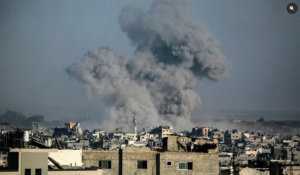Gaza residents say IDF escalated attacks in strip since Israel launched war on Iran

An Israeli strike in Jabalya, on 13 June 2025
Jack Khoury reports in Haaretz on 15 June 2025:
Twenty-nine Palestinians were killed and 380 wounded near aid centers opened by Israel and the United States in Gaza over the past 24 hours, the Hamas-run Health Ministry said on Sunday. According to Hamas, 90 Palestinians have been killed and more than 600 wounded across the Strip in the past 48 hours.
Gazans who spoke to Haaretz in recent days described a marked escalation in attacks amid Israel’s strike on Iran. An eyewitness from the Jabalya and Al-Mawasi refugee camps said heavy gunfire was opened on Palestinians approaching aid distribution points. “The army fired indiscriminately at people coming to collect food,” said a local resident, adding that “even drones fired into the crowd.” Furthermore, rescue teams struggled to reach the sites due to the dangerous conditions on the ground.
Heavy shelling was reported in multiple locations across southern Gaza, primarily near the city of Khan Yunis. According to reports, Israeli naval vessels fired toward the Shati refugee camp in the city’s western area, resulting in casualties, including women and children. Attacks were also reported in residential neighborhoods of Al-Tuffah in Gaza City, Beit Lahia in northern Gaza and Deir al-Balah in the central Strip.
According to the Gaza Health Ministry, since the aid centers opened, 274 Palestinians have been killed while traveling to or near these sites, and 2,532 have been wounded, mostly from gunfire. The opening of the aid centers was canceled early Saturday morning, but the Gaza Humanitarian Fund, which manages aid distribution in the Strip, announced that operations would resume the following day.
On Friday, GHF said it had distributed 35,520 aid packages. Executive Director Johnny Moore affirmed that GHF remains committed to its mission: to provide as much food as possible to as many people as possible.
The UN Under-Secretary-General for Humanitarian Affairs and Emergency Relief Coordinator, Tom Fletcher, issued a stark statement on Thursday regarding GHF operations.
“Hunger must never be met with bullets,” he said. “Humanitarians must be allowed to do their work. Lifesaving aid must reach people in need, in line with humanitarian principles. Without immediate and massively scaled-up access to the basic means of survival, we risk a descent into famine, further chaos and the loss of more lives,” he said.
Over the weekend, the IDF intensified its strikes around Nasser Hospital in Khan Yunis. Last week, the military issued evacuation orders for all areas surrounding the facility, the second-largest hospital in Gaza, and the attacks have since moved closer to the compound.
On Saturday and Sunday, both the UN and the International Committee of the Red Cross warned that the hospital’s closure would severely undermine the ability to provide medical care to nearly one million residents of southern Gaza. In a statement, the ICRC said that Nasser Hospital is critical for Gaza’s healthcare system and that no other facility in the area is equipped to handle patients requiring specialized treatment. “Repeated evacuation orders are isolating and undermining what little is left of the health-care system in Gaza,” said Adrian Zimmermann, ICRC head of the sub-delegation in Gaza. “These widespread evacuation orders – even with temporary exemptions – create bottlenecks that risk many preventable deaths,” he added.
This article is reproduced in its entirety
